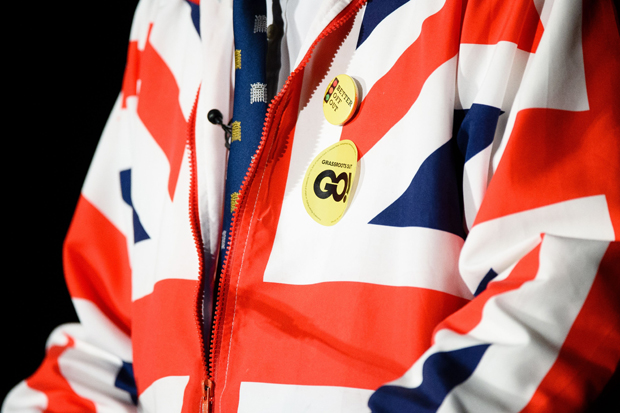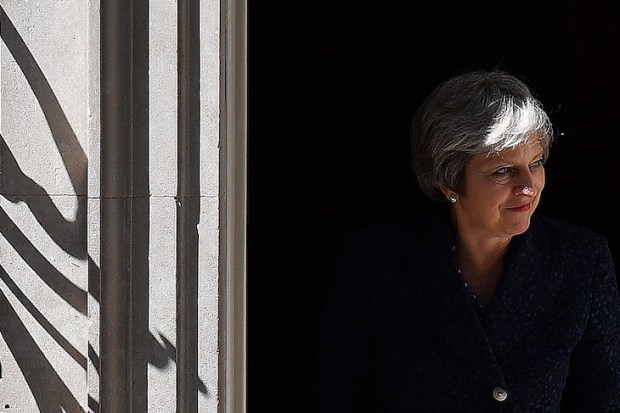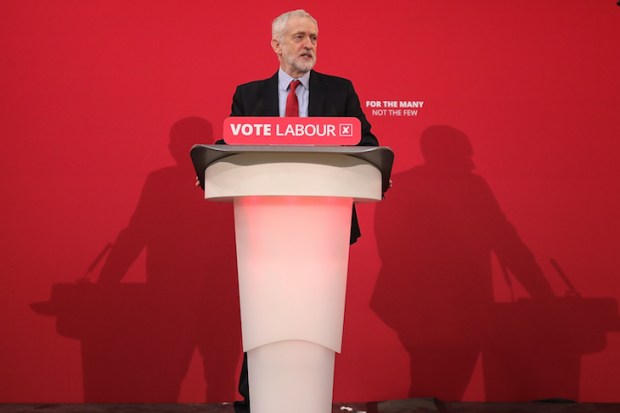Listen
On the day that David Cameron delivered his Bloomberg speech, the 2013 address in which he committed himself to a referendum on Britain’s EU membership, I asked a close ally of his how he would avoid splitting the Tory party over the issue, given that even quiet ‘outers’ might feel obliged to vote to leave. The ally paused before replying: ‘That would be a good problem to have, as it would mean we had won the election.’
That ‘good problem’ is now here. The Tory leadership is currently involved in a no-holds-barred campaign to limit the number of MPs who speak for ‘out’. An extraordinary amount of emotional energy is being spent to stop Justice Secretary Michael Gove backing ‘out’. He was one of the intellectual driving forces behind Cameron and Osborne’s Tory modernisation project and if he votes to leave it would be a personal blow to both men. It would also make clear that ‘out’ isn’t just the preserve of those who enjoy wearing Union Jack jackets.
But even those lower down the payroll are being treated to extensive lobbying. All week they’ve had text messages from Osborne urging them to call him, though this flurry of personal attention was undermined by the fact that many MPs don’t have his number and had no idea who was texting.
No one can accuse Downing Street of complacency in this campaign. Cameron is acutely aware that this is a career-defining moment. How history will judge him depends on two things. First, whether he wins, and secondly, whether he can put the Tory party back together again afterwards. But Cameron is not interested in any clever-clever approach to the second question. He has told his closest colleagues that he wants as many Tories backing ‘in’ as possible, even if that requires putting pressure on recalcitrant colleagues. He is also willing to fight in a way that many Tories will dislike; he was happy to defend the distinctly dubious claim that Brexit would see ‘The Jungle’ moving from Calais to Folkestone, for example.
The campaign has not begun in the way that Downing Street would have liked. It was expecting the press to be critical of the deal, but didn’t realise quite how hostile and prolonged the barrage would be. Cameron himself is tired and rather irritable, according to a No. 10 insider, and feels that he hasn’t been given the credit he deserves for striking what he, oddly, considers a very good deal. Part of his problem is that what he has conducted isn’t so much a renegotiation of Britain’s EU membership as a reordering of it. There was an assumption on the part of many voters that the renegotiation would deal with whatever irked them about the EU. In truth, though, Cameron and Osborne were trying to answer a different essay question. They wanted to negotiate a new place for Britain inside the EU but outside the single currency, to show that there was a third way between leaving and full integration.
This is why Osborne has personally taken charge of the negotiations over the relationship between nations in and out of the euro. In private, he has long been clear that this — not the welfare stuff — is for him the most important part of the renegotiation.
The other problem for Cameron and Osborne was that the British renegotiation ended up being a stand-alone affair. When the Bloomberg speech was delivered, the assumption was that there would be a new EU treaty before 2017 to formalise the further integration of the eurozone. They calculated that this would increase Britain’s negotiating leverage. But it never happened, and this has weakened Cameron’s hand. It means that he can’t now promise that the changes he negotiated will be immediately enshrined in a treaty. It has also resulted in this being a specifically British package, with little mention of broader changes to how the EU works.
It is a sign of his growing anxiety that Cameron has taken to arguing publicly that this referendum won’t be the end of his attempts to reform the EU. In his speech in Hamburg last week, he declared: ‘Even if we secure the changes I am arguing for, the job will not be done. There will be many things that would remain to be reformed.’ Privately, those close to Cameron are telling waverers that Britain will have another chance to secure changes when negotiations begin on a new EU treaty after the French and German elections in 2017.
Of course, much depends on the rival campaign. If those agitating to leave are represented by Nigel Farage, bombastic Ukip donor Arron Banks and Union Jack-jacketed MP Philip Hollobone then Cameron will have a very easy time portraying ‘out’ as the cause of cranks and gadflies. Indeed, No. 10 can barely disguise its excitement at the prospect of this group of oddballs getting the official campaign designation. However, an ‘out’ team led by Michael Gove, Priti Patel and James Dyson would be a very different matter. This would show that leaving the EU isn’t about returning to the past, but finding ways to maximise Britain’s future prospects. I understand a group of Eurosceptic junior ministers has agreed to meet early next week. These ministers, many of whom were members of the Fresh Start group which set out a bold plan for the renegotiation, hope to form a caucus of ‘sensibles for out’.
If, as seems almost certain, Cameron secures a deal at this week’s EU summit, the Cabinet will meet on Friday. I understand that no dissenting minister will be allowed to set out their opposition from Downing Street as they leave the meeting. No. 10 wants, for obvious reasons, to reserve the trappings of office for their side of the argument.
Cameron is a formidable politician and he will speak with the weight of his office behind him. But selling this deal as a radical change to Britain’s terms of EU membership might not be possible, even for him. Instead, he is going to have to fall back on the broader arguments for EU membership, which will further expose the Tory split on the issue. The ‘good problem’ could become a pretty bad problem very soon.
Got something to add? Join the discussion and comment below.
Get 10 issues for just $10
Subscribe to The Spectator Australia today for the next 10 magazine issues, plus full online access, for just $10.
You might disagree with half of it, but you’ll enjoy reading all of it. Try your first month for free, then just $2 a week for the remainder of your first year.















Comments
Don't miss out
Join the conversation with other Spectator Australia readers. Subscribe to leave a comment.
SUBSCRIBEAlready a subscriber? Log in